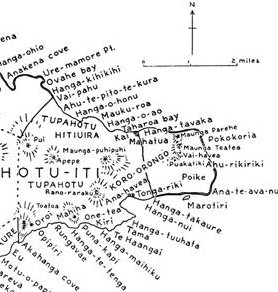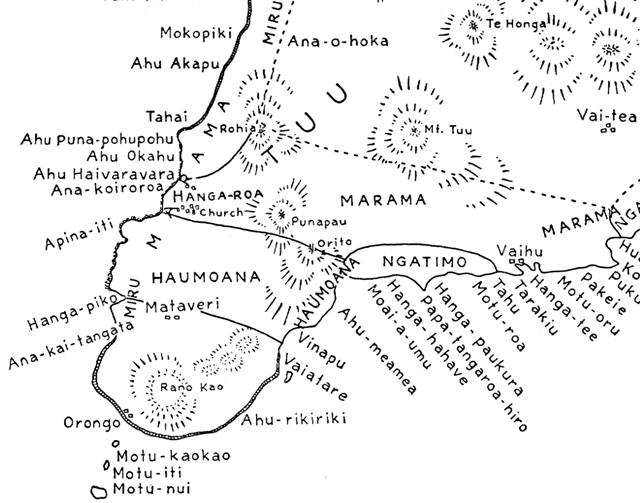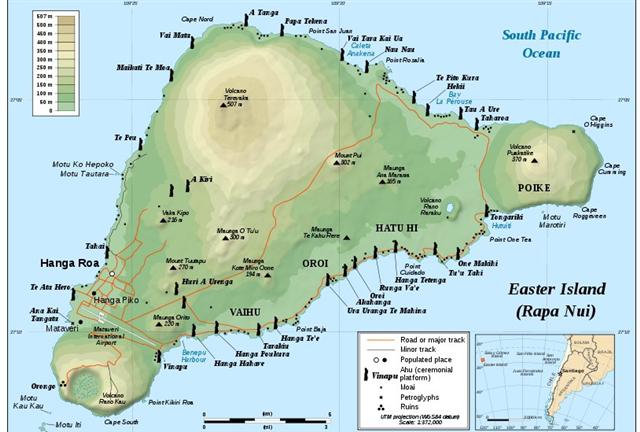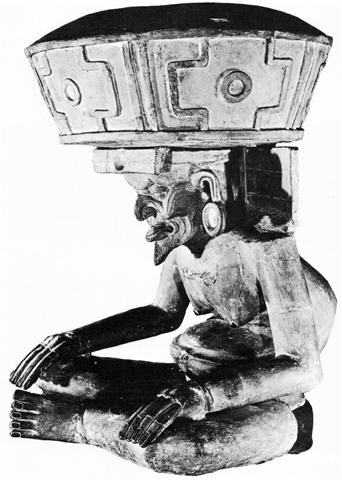4. In the geography of Easter Island Poike (Maori for 'place aloft') is the high peninsula in the east, in the direction of the rising Sun:  Possibly the end of the henua calendar could correspond to some place there, because midsummer is a high place. On the other hand the end of Sun should be down in the southwest:  Maybe Ana-kai-tagata corresponds to vaha kai (glyph 364) in the G text. If so, then the end of the henua calendar could be somewhere in the middle between Poike and Rano Kau, and the region around Anakena is a natural choice. But midsummer should be a high ground and the great central mountain Terevaka is more plausible:
The name Tere-vaka probably means 'the departure of the canoe', and beyond the midsummer high ground there suddenly is an abrupt change into 'sea'.
There should be 'sea' both around the pole of winter solstice and around the pole of summer solstice, because 'land' can be regarded to be where Sun moves (the tropical belt). In the Babylonian zodiac there is water both at the beginning of the year and at Eridu:
The flowing waters at Eridu are drawn similar to rima aueue signs (cfr at Da Capo):
Sagittarius has his front feet on the Cargo Boat and below Serpent there is another boat in form of the headgear of Ninmah. This headgear should be contrasted with the feathers adorning the preceding Eridu. Feathers on the head ought to be a sign which shows Sun in his last stage, when he is hidden, as in e.g. Gb2-11:
Eridu is far deep down and we should remember this is the place where fire is kept: ... In the morning of the world, there was nothing but water. The Loon was calling, and the old man who at that time bore the Raven's name, Nangkilstlas, asked her why. 'The gods are homeless', the Loon replied. 'I'll see to it', said the old man, without moving from the fire in his house on the floor of the sea. Then as the old man continued to lie by his fire, the Raven flew over the sea. The clouds broke. He flew upward, drove his beak into the sky and scrambled over the rim to the upper world. There he discovered a town, and in one of the houses a woman had just given birth. The Raven stole the skin and form of the newborn child ... Ninmah has a child in her lap. Probably the old man at the bottom of the sea is Xiuchtecuhtli, who has a brazier on his head (cfr at Atua Mata Viri):
Maybe Hanga Te Pau is this place, because the explorers went there to fetch fire: ... Again they went on and reached Hanga Hoonu. They saw it, looked around, and gave the name 'Hanga Hoonu A Hau Maka'. On the same day, when they had reached the Bay of Turtles, they made camp and rested. They all saw the fish that were there, that were present in large numbers - Ah! Then they all went into the water, moved toward the shore, and threw the fish (with their hands) onto the dry land. There were great numbers (? ka-mea-ro) of fish. There were tutuhi, paparava, and tahe mata pukupuku. Those were the three kinds of fish. After they had thrown the fish on the beach, Ira said, 'Make a fire and prepare the fish!' When he saw that there was no fire, Ira said, 'One of you go and bring the fire from Hanga Te Pau!' One of the young men went to the fire, took the fire and provisions (from the boat), turned around, and went back to Hanga Hoonu. When he arrived there, he sat down. They prepared the fish in the fire on the flat rocks, cooked them, and ate until they were completely satisfied. Then they gave the name 'The rock, where (the fish) were prepared in the fire with makoi (fruit of Thespesia populnea?) belongs to Ira' (Te Papa Tunu Makoi A Ira). They remained in Hanga Hoonu for five days ... To stay 5 days at Hanga Hoonu could refer to the black 5 nights beyond day number 360, the nights when gods are born (as by Nut in ancient Egypt). And if we disregard Te Pu Mahore and Te Poko Uri (which Makoi visited alone) then Hanga Hoonu will be station number 18 (indicating the black of Saturn who ignites new fires):
|
|||||||||||||||||||||||||||||||||||||||||||||||||||||||||||||||||||||||||||||||||||





